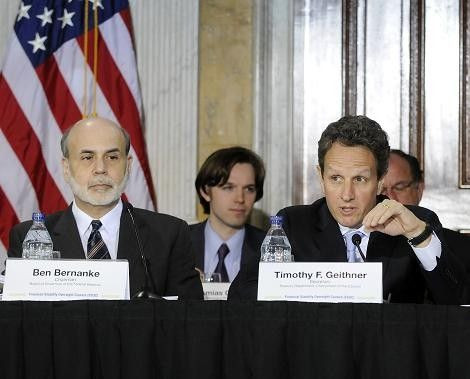Saving Capitalism from the Capitalists
Opinion

Regarding the financial crisis and U.S. and European economies -- the global economy, really -- there's good news and bad news.
First the bad news: Roughly three years in to policy makers' intervention to stabilize the financial system and keep credit markets liquid, the operative phrase is, Keep on, keeping on. Or in other words, central bank officials in the United States, in Europe, in the United Kingdom, and in Japan and China have to remain at-the-ready to provide more liquidity, stabilize more systemically-critical institutions, and if need be, create more special term facilities to keep credit markets liquid. End of discussion. No debate.
For those who disagree with the above -- for example, those who advocate a lack of a central bank response, and/or who somehow believe the market will solve the problem by itself, and/or who advocate a return to the gold standard -- you're advocating policies that are against your interest and that are self-defeating. So change your stance, in a hurry, for your own good: You have a vested-interest in seeing the modern/postmodern commercial system -- and corporate capitalism -- continue. Further, in addition to the commercial havoc a second freeze-up of global credit markets would trigger, somehow it's hard to envision the millions more Americans who would be added to the unemployment roles by such an event suddenly becoming Tea Party members advocating more income tax cuts for uber-rich and upper-income Americans who do not need them.
You asked about Occupy Wall Street? And what about it? Occupy Wall Street is an attention-getter. Two months ago, New York University Economics Professor Nouriel Dr. Doom Roubini -- who five years ago, in 2006, accurately predicted the bursting of the U.S. housing bubble -- predicted that the social unrest that hit Greece, the Middle East, and the United Kingdom would spread to other advanced economies and emerging markets. Occupy Wall Street is the start of that unrest, but let's keep things in perspective: it's only in its infancy -- the coalition is barely two months old, and there are many other blanks that have to be filled-in before one can forward an informed, meaningful observation regarding the coalition's role and impact. If economic and social conditions improve, OWS may fade; if they worsen, a response much more broad-based -- and all-encompassing -- may accompany OWS in its effort to seek economic and fiscal reform.
In other words, Occupy Wall Street is only Round 1 of a reform process that will take years, and OWS's role in that reform process may be small, or it may be large, depending on how economic events play-out.
Financial Crisis' Primary Cause
Further, for those who believe the financial crisis was triggered by too many low-income or working-class Americans taking out subprime mortgages, here's another attention-getter and item of important evidence: American International Group (AIG).
That's correct: AIG -- the supposed insurance company, that, in reality, was the world's largest hedge fund -- an entity that was levered and massively interconnected with key financial institutions around the globe. As many know, AIG is now U.S. Government AIG, as a brilliant, timely, and oh-so-vital intervention by the U.S. Federal Reserve, in conjunction with the U.S. Treasury, to the tune of about $182.5 billion -- stabilized AIG. And that intervention also quite possibly averted a reversion to the barter system.
Point: There is a lot of blame to go around regarding the financial crisis' cause, but at the core is a reckless, supply-side, the-free-market-is-always-right-and-is-the-metaphysical-sovereign philosophy that conservatives advocate. More than any other factor, that philosophy created the risk and greed behemoth that was the old AIG, and its companions, and, by extension, the financial crisis. And it was Keynesian economics and interventions that prevented a financial system collapse.
Now the good news: Underscoring, the operative phrase remains, Keep on, keeping on. Go U.S. Federal Reserve! Go European Central Bank! Go Bank of England, Swiss National Bank, Bank of Japan, and if necessary, the Bank of China too!
© Copyright IBTimes 2024. All rights reserved.





















